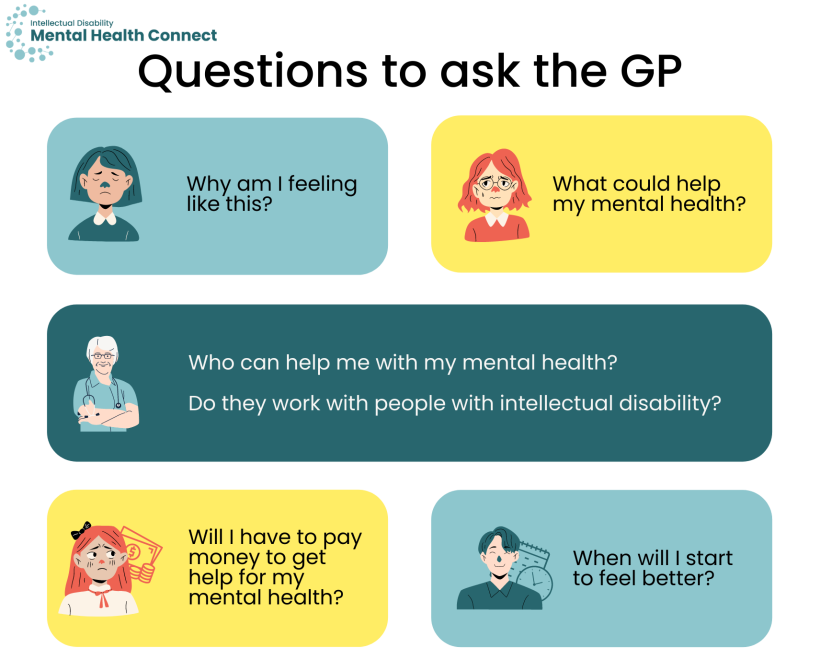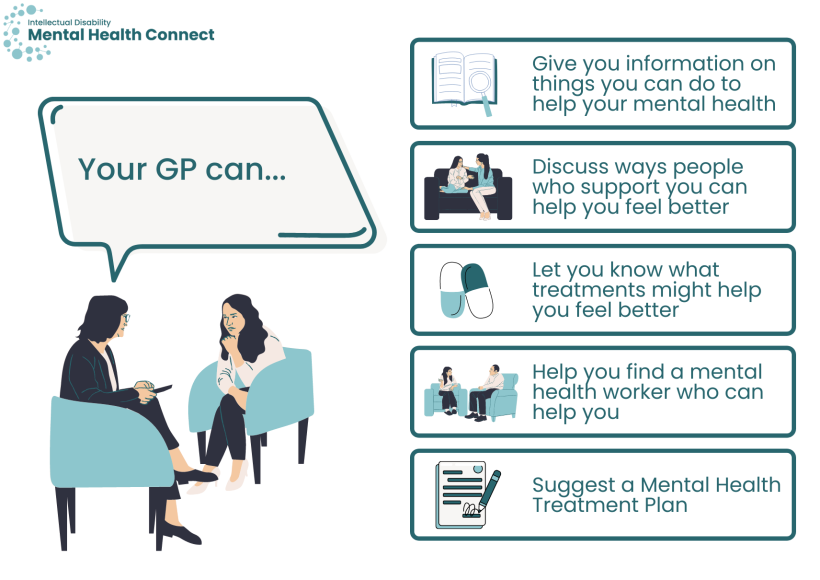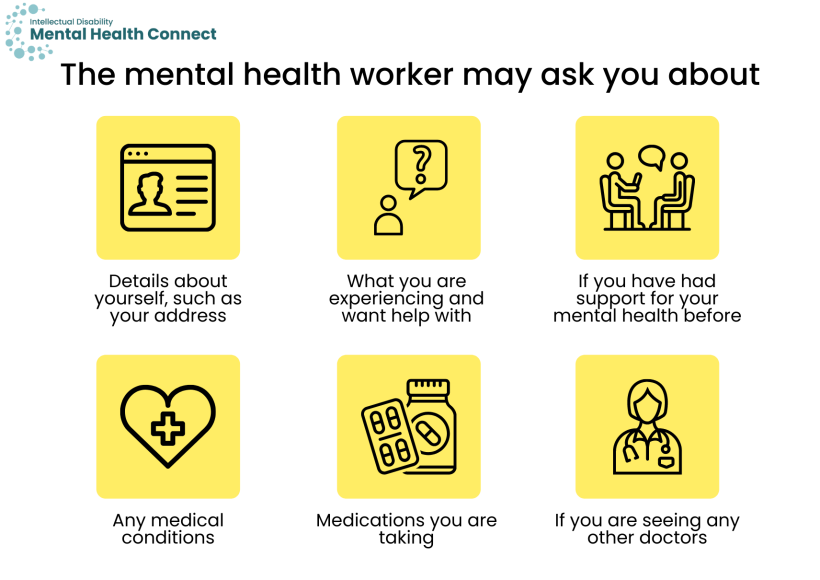Your first appointment
Jump to a section below
Key points
- You will usually see your doctor (GP) first to discuss your mental health.
- You can ask someone you trust to come with you to your appointment if you like.
- If you see a mental health worker, you may have an intake session. An intake session helps the mental health worker to find out about you and what is happening for you now.
- You can prepare for your visit to your GP or mental health worker by thinking about what you want help with.
Going to your GP
The first health worker most people go to for help with their mental health is their GP. A GP is the doctor that you see when are sick or need a health check. A GP is also known as a general practitioner. Your GP is your regular doctor.
You can take someone you trust to any appointment. Someone you trust could be your:
- carer
- family member
- support worker
- friend
- advocate.
An advocate is someone who helps you to speak up and get the support you need.
But it is OK to go on your own if you prefer.
You can get ready for the first visit. Sometimes it is very hard to say how you are feeling when you are communicating with a health worker. Thinking about what you want to say before you go can help. You can:
- think about what you want help with. It can help to make some notes.
- note down how you have been feeling over the last few weeks or months or ask someone to help you make notes. This can help you to remember.
- note down any questions you have or ask someone to help you note them down.
- practise communicating your points and asking your questions with someone you trust.
What happens when you go to your GP
Your GP will ask you how you have been feeling. You can tell them how you have been feeling and what has been going on in your life. For more information about communicating about your mental health visit Communicating about my mental health.
Your GP may also ask you:
- what has been happening for you in your life
- your GP may ask you if any stressful things have happened. For example if someone close to you has moved away or died, or if you are having trouble at home.
- about your mental health, for example, if you have been feeling down or worried
- about your physical health, for example, how you have been sleeping and if you have any pain
- how you take care of your body, including what you eat and how much exercise you get
- what medications you are taking and how they make you feel.
Medication is sometimes called medicine or drugs. Medicine can be in a tablet, a pill, a drink, or an injection. Doctors let people know which medicine to take to help make them better.
You can also ask the GP questions.
For example:
- why am I feeling like this?
- what could help my mental health?
- who can help me with my mental health?
- do they work with people with intellectual disability?
- will I have to pay money to get help for my mental health?
- when will I start to feel better?

Your GP will let you know what could help your mental health.
They may:
- give you information on things you can do to help your mental health
- discuss ways people who support you can help you feel better
- let you know what treatments might help you feel better
- help you find a mental health worker who can help you. They may suggest you see a health worker such as a psychologist or psychiatrist.
- A psychologist helps you with your mental health by talking with you. Psychologists help you find things you can do to feel better. Psychologists do not give you medication.
- A psychiatrist is a doctor who helps you with your mental health using talking and medication.
- For more information on these health workers visit Mental health services.
- suggest a Mental Health Treatment Plan. People who have been told they have a mental health disorder by a doctor can get a rebate for sessions of psychological support through Medicare. A rebate means you get some money back. You may still have to pay some money. For more information see the healthdirect website.
For more information about seeing your GP about mental health go to the healthdirect website.

Seeing a mental health worker
Your GP may suggest you see a psychiatrist, psychologist, or other health worker such as an occupational therapist. An occupational therapist is a health worker who can support people to take part in daily activities and support them to learn new skills. Occupational therapists are sometimes called an OT.
For more information about these mental health workers visit Mental health services.
There is a list of questions you may want to ask when finding a new mental health service in the community.
Intake session
Before you start seeing a health worker, you may have what is called an ‘intake’ session. An intake session helps the mental health worker to find out:
- a bit about you
- what is happening for you now
- whether the mental health worker or service will be right for you.
You can have someone you trust with you during an intake session.
You can get ready for an intake session by:
- thinking about what you want to tell the mental health worker
- noting down any questions you have.
What happens during an intake session
- During an intake session, the mental health worker may ask you:
- details about yourself such as your address and who you live with
- what you are experiencing and want help with
- if you have had support for your mental health before
- if you have any medical conditions
- if you are taking any medication
- if you are seeing any other doctors.

You can ask someone you trust to help you give this information to the mental health worker if you want.
What happens next
You might:
- make an appointment at the end of the intake session for an assessment session or
- the mental health worker may need to discuss whether the service is right for you with someone they work with.
If the mental health worker says the service will not be right for you:
- you can ask them why
- you can ask them to suggest another service that could help you
- you can go back to your GP and ask them to suggest another mental health worker.
Tips
- You may feel nervous in waiting rooms. This is normal. After you check in with the service, you can wait outside or wait in the car if it is close by. Ask the person at the check in to call you when the mental health worker is ready to see you.
- If you do not understand something the health worker says, it is OK to speak up. Ask them to repeat what they said or to say it another way.
- Tell the mental health worker if you think you will have trouble getting to your appointments. They can help you and may be able to come and see you in your home.
If you go to the emergency department for your mental health
Emergency departments are sometimes called ED. The emergency department is usually where you go if you have an urgent health problem, especially if you cannot get the help you need in the community.
- If you need to go to the emergency department at a hospital, a nurse will see you soon after you arrive. The nurse will ask you how you are feeling and what is wrong.
- You may have to wait a while to see a doctor. Ask the nurse if there is somewhere quiet you can sit if the noise or number of people in the emergency department is worrying you.
- You may feel stressed or afraid if you need to go to the emergency department. This is normal. You can tell the nurse or doctor if you are afraid. They will do all they can to make you feel comfortable.
- You can ask the nurses and doctors:
- what is going to happen now?
- how long will I have to wait?
Resources
- The healthdirect website has information about seeing your GP about mental health.
- For information about a Mental Health Treatment Plan also see the healthdirect website.